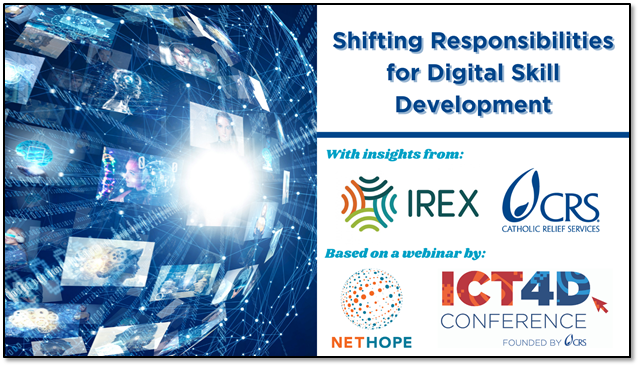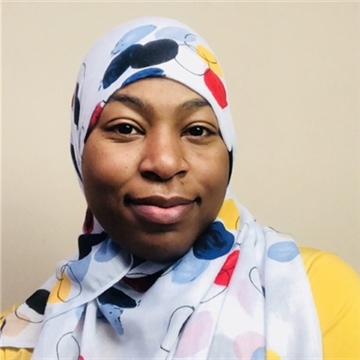
Shifting Responsibilities for Digital Skill Development
Inspired by the recent webinar on digital skills for a global workforce, we’d like to explore if and how responsibilities for digital skill development are changing in the NGO space!
Programing at a distance and the increased use of digital solutions during the pandemic have created an even stronger need for organizations to skill up internally and support their implementing partners. The webinar featured Priscilla Chomba-Kinywa, Global Head of Digital and Technology ActionAid; Coniqua Abdul-Malik, Manager for Learning Design and Capacity Building Catholic Relief Services; Nanna Sten Andersen, Educationalist and Clinical Trainer Maternity Foundation; and, last but certainly not least, Jesus Melendez Vicente, Senior Technical Advisor, Data and Digital Development IREX.
One of the most interesting points of discussion, and there were many, was when Priscilla states,
I’m going to put my neck on the line here and predict that the notion of an IT department that sits in a corner of the operations team will soon be a thing of the past.
Subsequently, she explains that at ActionAid they haven’t had anything called an IT Department for a number of years now. This could be due in large part to HR departments actively recruiting people with digital skills for non-IT staff. Essentially, digital skills are a requirement of all newly hired employees in today’s society which has been forever changed by the COVID-19 pandemic.
This leads to some thought provoking questions about what the future may hold:
- Who is responsible for digital skills development at your organization?
- How do you see those responsibilities changing? In your organization or more generally.
This is what the presenters had to say when asked:
 Jesus Melendez Vicente, IREX
Jesus Melendez Vicente, IREX
At IREX, there isn’t a single team fully dedicated to digital skills development. Instead, different teams support a variety of digital skills training such as: digital safety and digital security (e.g., behavioral cyber-risk management, personal and organizational cybersecurity management) provided by IT; data literacy (e.g., data for leaders and data learning journey) is being supported by the Center for Applied Learning and Impact (CALI), and media & information literacy (e.g., Learn to Discern program) is supported by both the CALI team and the media and information practice. The CALI team has also developed guides to train staff in online communications & collaboration. I would also like to highlight some of the training on data literacy and media literacy, which targeted both internal IREX employees, as well as the needs of programs and its participants.
Moving forward, IREX could develop a more comprehensive and cohesive approach to building digital skills across our organization, supporting employees current digital competencies needs knowledge, skills, behaviors“ as well as setting a good foundation for future talent development. In my opinion, it is important that we follow existing digital competencies and skills frameworks (e.g., Digital Intelligence Framework (DQ), Digicomp 2.0), adapting these to meet organizational level needs as well as individual’s personal development objectives. Working with organizations like NetHope and using their Digital Skills Framework for non-profits is also a great way to standardize and prioritize trainings in this area, with the added opportunity of learning from peer organizations while also contributing to this very important body of knowledge.
Developing 21st century digital skills should be a strategic priority for any iNGO to stay competitive and continue to make a difference in an increasing digitized world.
We must embrace digital skills training as a holistic and ongoing capacity building program, that strengthens competences and capabilities, supports engagement of employees across the organization, enables work with partners and facilitates engagement with participants in our programs. I don’t think is a question of one team being responsible for the full range of digital skills development, it should be a collaborative effort with full senior executive support. NOTE that this is my personal opinion.
 Coniqua Abdul-Malik, CRS
Coniqua Abdul-Malik, CRS
The idea of more distributed IT expertise throughout agencies is an interesting one especially as digital skills become increasingly necessary across all job families.
While the development of digital skills should be an all-hands effort, I do see the importance of some ownership for decision making around the enterprise-level platforms the agency invests in to support collaboration in the new digital workplace.
In sum, the discussion around internal digital capacity building seems to indicate that many organizations are rethinking their approaches. Not just within their agencies, but there is also a more general call for better collaboration on digital literacy and skills development in our sector at large.
Be sure to check out the whole webinar for more insights into upskilling digitally for programing at a distance and the increased use of tech in this new era here brought to you by NetHope and the ICT4D Conference! If this doesn’t satisfy your craving for capacity building in tech, check out this webinar from last year also brought to you by NetHope and the ICT4D Conference on Skills and Standards for a Digital Workforce!
By: Paul S. Wiedmaier, Knowledge Management & Communications Specialist ICT4D, Catholic Relief Services